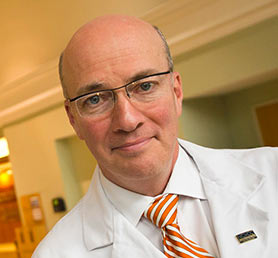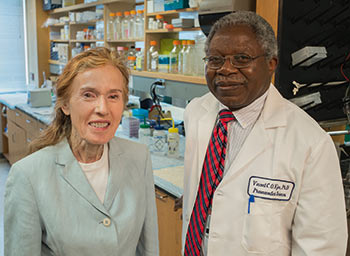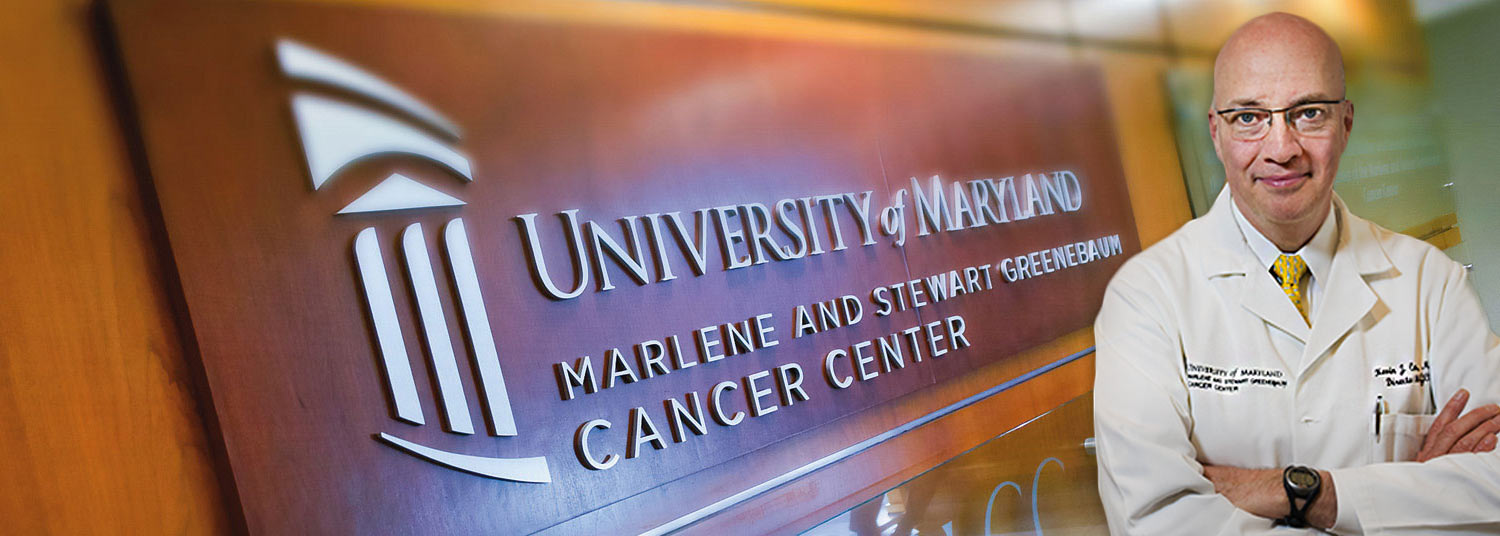Excellence in Cancer Research
The University of Maryland’s Greenebaum Comprehensive Cancer Center (UMGCCC) is a nationally respected cancer center with high caliber scientific leadership and robust programs in basic, clinical and population science research.
In 2016, the center added the prestigious “comprehensive” title to its already prominent stature, making it one of only 53 programs in the United States so designated by the National Cancer Institute (NCI). This designation means that the UMGCCC has met NCI’s maximum standards for ranking among the most exceptional cancer programs in the country.
In addition to its research, community outreach and expansive training programs, the center has multidisciplinary clinical programs for all major cancers (breast, brain, cutaneous, head and neck, gastrointestinal, genitourinary, gynecological, hematologic malignancies, and thoracic cancer).
Research Programs

Kevin J. Cullen, MD, director of UMGCCC
UMGCCC is among the top echelon of cancer centers in the country," says Kevin J. Cullen, MD, the Marlene and Stewart Greenebaum Distinguished Professor of Oncology at the University of Maryland School of Medicine and the cancer center's director. "We are very proud of our community engagement, our training programs, and most importantly, our ability to translate discoveries in the laboratory into better treatments for cancer patients in Maryland and beyond."
The goal of the UMGCC’s interactive, multidisciplinary research program—consisting of both clinical basic and community-based researchers—is to take advantage of discoveries in basic cancer biology and in specialty translational research programs in order to develop and apply innovative cancer treatment and prevention strategies.
Extensive programs in five strategic areas probe both cause and cure of some of the world’s deadliest malignancies: hormone responsive cancers, tumor immunology and immunotherapy, molecular and structural biology, and population science.
The Tumor Immunology and Immunotherapy program seeks to develop and implement immune-based strategies such as CAR-T therapy to prevent, treat, and/or monitor malignant diseases. The program’s research and clinical endeavors fall under three themes: cell-based cancer immunotherapies designed to elicit active tumor immunity; inhibition of immunosuppression; and investigating the roles of infection and inflammatory responses in cancer development.
The Experimental Therapeutics program’s ultimate goal is building translational clinical trials based on innovative laboratory research projects. These projects focus on developing new drugs based on novel molecular targets and creating new strategies for delivering treatments and utilizing radiation.
The Molecular and Structural Biology program focuses on elucidating molecular mechanisms and cellular processes that are altered in cancer and using that knowledge to improve both diagnostic and therapeutic efforts against cancer.
The Hormone Related Cancers program centers on efforts toward reducing morbidity and mortality from these cancers and better understanding the pathophysiological processes that determine the behavior of malignancies of hormone responsive tissue, particularly the breast and prostate.
The Population Science program focuses on epidemiology of infection and hormone-related cancers, tobacco and nicotine, cancer prevention, early detection, cancer survivorship and health disparities. Program researchers use their epidemiological studies to guide the development and evaluation of behavioral interventions to improve cancer-related health.

Angela Brodie, PhD, and collaborator Vincent C.O. Njar, PhD
“Her pioneering work on the invention and development of aromatase inhibitors was the single most important contribution to the treatment of breast cancer in the last generation.” – Kevin J. Cullen, MD
A Lasting Scientific Legacy
Basic and clinical research at UMGCCC has resulted in numerous advances in cancer therapy as well as deepened our understanding of the processes of cancer development and progression.
Among the most prominent outputs of the center’s research efforts was the development of inhibitors of aromatase, an enzyme that makes estrogen, a growth factor in breast cancer. These compounds, pioneered by the late Angela Brodie, PhD, have saved countless lives worldwide. Dr. Brodie passed away several years ago, but her spirit lives on at UMGCCC with a named professorship and a very strong breast cancer research and treatment program inspired by her dedication and life’s work.
Other new treatments currently under development by UMGCCC scientists include a drug that shows promise for advanced prostate cancer; ways to harness patients’ own immune systems to eradicate blood, lung and breast cancers; and many, many more.
Local Focus, Global Reach
UMGCCC serves a diverse population state-wide with significant minority representation. With an emphasis on health disparities and community engagement, the center seeks to understand the basis for differences in cancer incidence, response, and survival in different populations. In addition to these studies of health disparities, another priority is increasing the participation of underrepresented minorities in clinical trials, achieving a current participation rate of over 40 percent.
Epidemiologists in the Population Science program strive to identify molecular, environmental and lifestyle determinants of viral and hormone-related cancers in the U.S. and around the world. Behavioral scientists in the program work on issues of tobacco control and early detection and prevention among vulnerable and underserved populations. Our Community Outreach and Engagement program partners with local African-American faith communities, training lay community advisors to educate peers about cancer screening. The Population Science program is also the lead on an international study aimed at identifying determinants of ovarian and endometrial cancers.
Training tomorrow’s oncologists
The center integrates its discovery and translational research programs with an ambitious training and education initiative that spans the continuum from middle school to undergraduates, graduates, post graduates and residents, as well as continuing education for practicing health care professionals.
UMGCCC supports cancer education, research training, career development, and continuing education programs that stream through our community, from middle school through postdoctoral education. Educational and career advancement activities are leveraged across all programs and with community partners in our catchment area, sister campuses such as UMCP, UMBC, Towson University, and Morgan State University.
During the past 5 years, our cancer training programs provided research experiences and career development opportunities for more than 730 students across the training and education continuum. These programs are supported by 17 National Institutes of Health grants; 3 additional cancer-focused or cancer-related institutional training grants, including 2 grants from the National Cancer Institute; and several individual fellowships.

